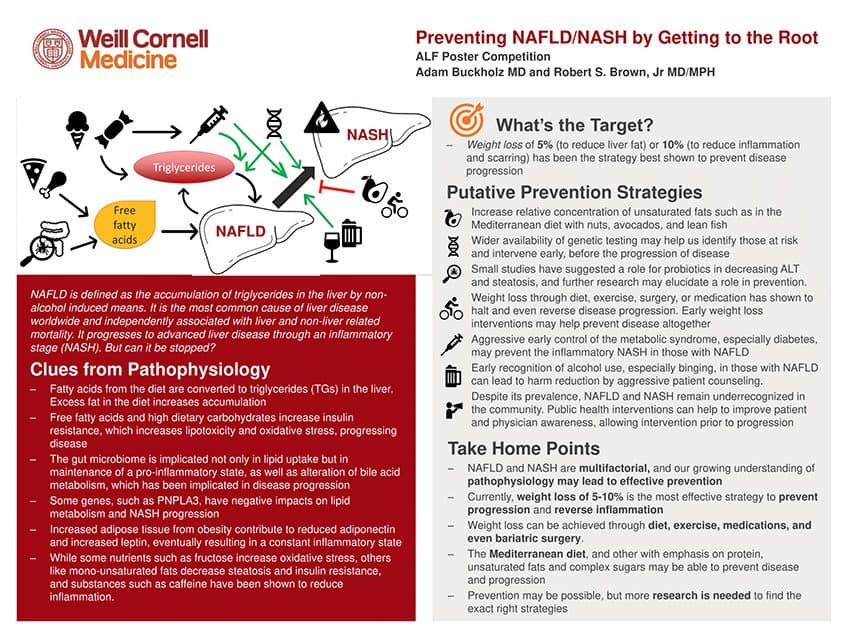Preventing NAFLD/NASH by Getting to the Root
Adam Buckholz, MD and Robert S. Brown, Jr., MD, MPH
NewYork-Presbyterian/Weill Cornell Medical Center
This presentation is an excerpt from the ALF 2021 Poster Competition. This competition showcases posters and a brief video created by early career investigators from across the country on six areas of educational focus: fatty liver disease, liver cancer, liver transplantation, pediatric liver disease, rare liver disease and viral hepatitis. Participants are tasked with translating complicated medical information into a poster which can be easily understood by patients or the public. Posters are reviewed by a formal panel of judges comprised of Medical Advisory Council members, Board Members and friends of ALF to select a winner in each category.

Nonalcoholic fatty liver disease (NAFLD) is closely associated with the metabolic syndrome and has rapidly grown in prevalence to become the leading cause of chronic liver disease in the US. Most patients with NAFLD will not have disease progression to inflammation, or nonalcoholic steatohepatitis (NASH) and cirrhosis. However, it’s unclear how to determine which patients will progress, and whether prevention of incidence and progression are possible. In exploring potential pathways for prevention of disease and progression, it’s important to note the multi-factorial nature of the disease. In its most basic form, NAFLD arises from excess triglyceride deposition. Dietary composition, exercise, alcohol intake, the gut microbiome, truncal adiposity, and genetics all affect fat deposition and progression to inflammation. Current recommendations focus on the best known intervention, 5-10% loss of body weight. This can be achieved in a number of different ways, especially through diet. The Mediterranean diet consisting of high concentrations of plant-based carbohydrates such as fruits and vegetables, mono-unsaturated fatty acids such as those in olive oil and lean proteins such as nuts and fish is the best studied and most frequently recommended. Other options such as intermittent fasting, or going 16 hours a day with no caloric intake, likewise show promise. Weight loss surgery and medications like semaglutide improve inflammation and reduce insulin resistance, so may help to freeze disease progression. Complex non-dietary mechanisms may also offer future directions for prevention. For example, widespread genetic testing may help us identify those with a predisposition earlier, and alteration of the microbiome shows early promise for reducing inflammation. Finally, broader patient and physician awareness and public health interventions may help tackle this disease earlier. While further research is clearly needed, there are a number of promising future avenues to prevent this critical disease.
Last updated on December 1st, 2022 at 04:47 pm